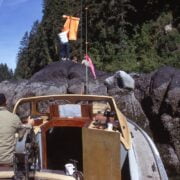
The Power of Tourism: How Travel Impacts Local Economies
Tourism is defined as the activity of people traveling to and staying in places outside their usual environment for leisure, business, or other purposes. It plays a crucial role in the global economy, contributing to job creation, infrastructure development, and government revenue. The economic benefits of tourism are vast and can have a significant impact on local economies.
Tourism is an important source of income for many countries and regions around the world. It brings in foreign exchange earnings, stimulates economic growth, and creates employment opportunities. In fact, according to the World Travel & Tourism Council (WTTC), the travel and tourism sector accounted for 10.4% of global GDP and 319 million jobs in 2018.
Key Takeaways
- Tourism creates job opportunities and contributes to employment growth.
- Tourism stimulates local business growth and development.
- Tourism has a positive impact on infrastructure development and investment.
- Sustainable tourism practices are crucial for the growth of local economies.
- Tourism has the potential to diversify local economies and increase government revenue.
How Tourism Contributes to Job Creation and Employment Opportunities
One of the most significant economic benefits of tourism is its contribution to job creation and employment opportunities. The travel and tourism sector is labor-intensive, meaning it requires a large workforce to meet the demands of tourists. This leads to the creation of various types of jobs, ranging from hotel staff and tour guides to restaurant workers and transportation providers.
According to the WTTC, the travel and tourism sector supported 10% of global employment in 2018. This translates to approximately 319 million jobs worldwide. In many developing countries, tourism is a vital source of employment, particularly for women and young people who may have limited access to other job opportunities. By providing jobs, tourism helps reduce unemployment rates and alleviate poverty in local communities.
The Role of Tourism in Stimulating Local Business Growth
Tourism plays a crucial role in stimulating local business growth. When tourists visit a destination, they require various goods and services, such as accommodation, food and beverages, transportation, souvenirs, and entertainment. This creates a demand for local businesses to cater to the needs of tourists.
Local businesses that benefit from tourism include hotels, restaurants, tour operators, souvenir shops, and transportation providers. These businesses not only generate revenue for themselves but also contribute to the local economy through taxes and job creation. Moreover, tourism can attract new businesses to an area, as entrepreneurs recognize the potential for profit in catering to the needs of tourists.
The Effect of Tourism on Infrastructure Development and Investment
| Metrics | Description |
|---|---|
| Tourist arrivals | The number of tourists visiting a particular destination |
| Infrastructure development | The construction or improvement of roads, airports, hotels, and other facilities to support tourism |
| Investment in tourism | The amount of money invested in tourism-related projects such as hotels, resorts, and attractions |
| Job creation | The number of jobs created in the tourism industry, including direct and indirect employment |
| Economic impact | The contribution of tourism to the local economy, including revenue generated, taxes paid, and multiplier effects |
| Sustainability | The ability of tourism to support long-term economic, social, and environmental goals |
Tourism can have a significant impact on infrastructure development and investment in a destination. In order to accommodate the needs of tourists, destinations often need to improve their infrastructure, including transportation networks, airports, roads, and public facilities. This not only enhances the experience of tourists but also benefits the local population by providing better access to essential services.
For example, many popular tourist destinations have seen improvements in their transportation infrastructure due to tourism. Airports have been expanded or built from scratch, roads have been upgraded, and public transportation systems have been developed. These infrastructure improvements not only benefit tourists but also attract investment from businesses looking to capitalize on the growing tourism industry.
The Importance of Sustainable Tourism Practices for Local Economies
Sustainable tourism refers to tourism that takes into account its current and future economic, social, and environmental impacts. It aims to minimize negative impacts on the environment and local communities while maximizing the positive benefits of tourism. Sustainable tourism practices are crucial for the long-term success and economic growth of destinations.
There are several benefits of sustainable tourism for local economies. Firstly, it helps protect natural resources and cultural heritage, which are often key attractions for tourists. By preserving these assets, destinations can continue to attract visitors in the long run. Secondly, sustainable tourism practices promote responsible consumption and production, which can lead to cost savings for businesses and reduce their environmental footprint.
Examples of sustainable tourism practices include promoting eco-friendly accommodations, implementing waste management systems, supporting local artisans and producers, and educating tourists about responsible behavior. By adopting these practices, destinations can ensure that tourism continues to benefit their local economies without compromising the environment or local communities.
The Impact of Tourism on Government Revenue and Taxation
Tourism generates revenue for governments through various channels. Firstly, tourists often pay taxes and fees when entering a destination, such as visa fees or airport taxes. These fees contribute to government revenue and can be used to fund public services and infrastructure development. Secondly, tourism-related businesses pay taxes on their earnings, which also contribute to government revenue.
Moreover, tourism can have a multiplier effect on the economy, meaning that the money spent by tourists circulates through the local economy and generates additional economic activity. This leads to increased tax revenue for governments. According to the WTTC, in 2018, travel and tourism directly contributed $8.8 trillion to the global economy and generated $1.5 trillion in tax revenue.
The Potential for Tourism to Diversify Local Economies
Tourism has the potential to diversify local economies by creating new sources of income and employment. Many destinations that were previously reliant on a single industry, such as agriculture or manufacturing, have successfully diversified their economies through tourism. This diversification is important for economic stability, as it reduces dependence on a single industry and makes the local economy more resilient to external shocks.
For example, countries like Costa Rica and Iceland have successfully diversified their economies through tourism. Costa Rica has become a popular ecotourism destination, attracting visitors with its rich biodiversity and natural beauty. Iceland has capitalized on its unique landscapes and geothermal resources to become a popular destination for adventure tourism.
The Influence of Tourism on Real Estate and Property Markets
Tourism can have a significant influence on real estate and property markets in destinations. When an area becomes popular among tourists, demand for accommodation increases, leading to higher property values and rental prices. This can benefit property owners and investors who can capitalize on the growing tourism industry.
Moreover, tourism can drive real estate development in destinations. Developers may build hotels, resorts, and vacation rentals to cater to the needs of tourists. This not only creates job opportunities in the construction industry but also stimulates economic growth through increased spending on goods and services.
The Significance of Cultural Tourism for Preserving Local Heritage and Traditions
Cultural tourism refers to tourism that focuses on experiencing the culture, heritage, and traditions of a destination. It plays a crucial role in preserving local heritage and traditions by creating awareness and appreciation among tourists. Cultural tourism initiatives often involve visits to historical sites, museums, art galleries, festivals, and performances.
By promoting cultural tourism, destinations can preserve their unique identity and traditions, which are often key attractions for tourists. This not only helps maintain the cultural heritage of a destination but also generates economic benefits by attracting visitors. Moreover, cultural tourism can create opportunities for local artisans and producers to showcase their crafts and products, contributing to the local economy.
The Future of Tourism and its Potential for Economic Growth
In conclusion, tourism offers numerous economic benefits for local economies. It contributes to job creation and employment opportunities, stimulates local business growth, drives infrastructure development and investment, generates government revenue through taxes and fees, diversifies local economies, influences real estate and property markets, and preserves local heritage and traditions.
However, it is important to note that sustainable tourism practices are crucial for the long-term success and economic growth of destinations. By adopting sustainable practices, destinations can ensure that tourism continues to benefit their local economies without compromising the environment or local communities.
The future of tourism holds great potential for economic growth. As more people around the world have access to travel and as new destinations emerge as popular tourist spots, the travel and tourism sector is expected to continue growing. This presents opportunities for destinations to capitalize on the economic benefits of tourism and drive sustainable economic growth in the future.
If you’re interested in exploring the economic impact of tourism further, you might find this article from Wave Magnets insightful. It delves into the various ways in which tourism can contribute to a country’s economy and highlights the potential benefits and challenges associated with this industry. To gain a deeper understanding of the subject, check out their article on the economic impact of tourism: https://wavemagnets.com/sample-page/.
FAQs
What is the economic impact of tourism?
The economic impact of tourism refers to the contribution of tourism to the economy of a particular region or country. It includes the direct and indirect effects of tourism on employment, income, and economic growth.
How does tourism contribute to employment?
Tourism creates jobs directly in the tourism industry, such as hotels, restaurants, and tour operators. It also creates indirect jobs in other sectors, such as transportation, retail, and construction.
What is the role of tourism in economic growth?
Tourism can stimulate economic growth by generating foreign exchange earnings, increasing government revenue, and promoting investment in infrastructure and other sectors.
What are the benefits of tourism for local communities?
Tourism can bring benefits to local communities by creating job opportunities, promoting cultural exchange, and supporting local businesses. It can also contribute to the preservation of natural and cultural heritage.
What are the challenges of tourism for local communities?
Tourism can also bring challenges to local communities, such as overcrowding, environmental degradation, and cultural commodification. It is important to manage tourism in a sustainable way to minimize negative impacts and maximize benefits.













